Kozeluch Moisè in Egitto
Spirited singing and playing make this an attractive introduction
View record and artist detailsRecord and Artist Details
Composer or Director: Leopold Kozeluch
Genre:
Vocal
Label: CPO
Magazine Review Date: 4/2004
Media Format: CD or Download
Media Runtime: 104
Mastering:
Stereo
DDD
Catalogue Number: CPO999 948-2

Tracks:
| Composition | Artist Credit |
|---|---|
| Moses in Egypt |
Leopold Kozeluch, Composer
(Das) Kleine Konzert Hermann Max, Conductor Leopold Kozeluch, Composer Linda Perillo, Soprano Markus Schäfer, Tenor Rheinische Kantorei Simone Kermes, Soprano Tom Sol, Bass |
Author: John Steane
The year is 1787, and this is very much a work of its time. Not a bad time either if you like oratorio to sound not too evidently sacred, more like opera in fact, and opera itself to stay within the boundary of good manners without slopping or boiling over into sentimentality or melodrama. An aria may imply humane feeling and even a serious anxiety while carrying also the suggestion of a grave courtly dance. A chorus may launch and sustain a good old-fashioned oratorio fugue, but will not outstay its welcome or don too austere an academic dress. As for the characters, Pharoah’s daughter Merime is a prima donna as well as a foster-mother, Aaron is an impulsive youth, Moses an earnest son and leader, and a virtuoso tenor to boot, while Pharaoh himself blusters in a way that might provoke laughter were he not a personage out of something other than the Bible.
A spirited and prolific composer, Leopold Kozeluch is certainly not over-represented in the record catalogues, and this major work could afford an impressive introduction. He came from Bohemia, via Prague, to Vienna at a time when native talent was hardly in short supply, nevertheless gaining the top job, as court composer, and dying in office, aged over 70, in 1818. His output was largely secular, Moses being his only oratorio; his most successful operas are believed to be lost. An attractive, and ‘modern’, feature is that the recitatives are all accompagnato, not secco. The arias are in traditional da capo form, but there is also a fair sprinkling of trios and duets. A most striking number is the finale of Part 1, an extended piece for solo quartet and chorus, capped drastically by a storm chorus presaging the onset of the plagues (which Kozeluch omits, one would like to think in deference to Handel).
The performance is fine: stylishly conducted, with plenty of attack as well as refinement from orchestra and chorus, and good work by the soloists. An interesting feature is the provision of both versions of Merime’s aria in Part 2, the second substituted at a revival in 1790 (more adventurous and expressive), the first a brilliant C major tour de force for the soprano Simone Kermes, whose cadenza accommodates a pinging G natural in alt.
Linda Perilla is the bright-toned, boyish Aaron, Markus Schäfer a Moses who from time to time sounds rather like the late Richard Lewis. The casting of Pharoah presents problems and in Tom Sol’s incisive if by no means ingratiating high basso they have probably found an apt solution. I wish the small print of the booklet suited my eyes equally well.
A spirited and prolific composer, Leopold Kozeluch is certainly not over-represented in the record catalogues, and this major work could afford an impressive introduction. He came from Bohemia, via Prague, to Vienna at a time when native talent was hardly in short supply, nevertheless gaining the top job, as court composer, and dying in office, aged over 70, in 1818. His output was largely secular, Moses being his only oratorio; his most successful operas are believed to be lost. An attractive, and ‘modern’, feature is that the recitatives are all accompagnato, not secco. The arias are in traditional da capo form, but there is also a fair sprinkling of trios and duets. A most striking number is the finale of Part 1, an extended piece for solo quartet and chorus, capped drastically by a storm chorus presaging the onset of the plagues (which Kozeluch omits, one would like to think in deference to Handel).
The performance is fine: stylishly conducted, with plenty of attack as well as refinement from orchestra and chorus, and good work by the soloists. An interesting feature is the provision of both versions of Merime’s aria in Part 2, the second substituted at a revival in 1790 (more adventurous and expressive), the first a brilliant C major tour de force for the soprano Simone Kermes, whose cadenza accommodates a pinging G natural in alt.
Linda Perilla is the bright-toned, boyish Aaron, Markus Schäfer a Moses who from time to time sounds rather like the late Richard Lewis. The casting of Pharoah presents problems and in Tom Sol’s incisive if by no means ingratiating high basso they have probably found an apt solution. I wish the small print of the booklet suited my eyes equally well.
Discover the world's largest classical music catalogue with Presto Music.

Gramophone Digital Club
- Digital Edition
- Digital Archive
- Reviews Database
- Full website access
From £8.75 / month
Subscribe
Gramophone Full Club
- Print Edition
- Digital Edition
- Digital Archive
- Reviews Database
- Full website access
From £11.00 / month
Subscribe
If you are a library, university or other organisation that would be interested in an institutional subscription to Gramophone please click here for further information.




